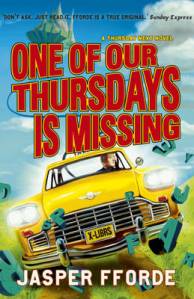 My love affair with Jasper Fforde and the Thursday Next series continues with this latest book. The inventiveness of Fforde knows no bounds!
My love affair with Jasper Fforde and the Thursday Next series continues with this latest book. The inventiveness of Fforde knows no bounds!
In this latest installment, while it is still technically a Thursday Next book, the original character does not appear in it except for a few paragraphs. How can this be? In the past books, there had been increasingly more ‘Thursdays’ coming into existence due to Thursday’s adventures being fictionalised. The real Thursday is able to visit and train these new character actors into being authentic Thursdays because she has the ability to ‘book jump’ and immerse herself into any book.
When this latest installment begins, we soon discover, after a few furious head scratching and befuzzlement, that we aren’t reading about the original Thursday Next but the latest actress who is playing her within the book. A story set within a story. It’s incredibly fun to read the going-ons within the actual book and how the various characters contend with plots. The actors can also sense what part of the story the reader is reading.
‘– hang on,’ said Dad, or rather, the character playing my book-father, ‘I think they’ve gone.’
I tasted the air. He was right. Our lone reader had stopped and left us dangling in a narrative dead zone …
‘I was marvellous.’ intoned my book-father haughtily, the inference being that it was somehow my fault the reader didn’t last until even the end of the second page, ‘you need to engage the readers more, darling. Project yourself. Make the character come alive.’ – p. 18
Thursday is soon placed under instruction to discover the unauthorised destruction of a book and we are taken on a tatalising ride through Book World. Politically, time is also extremely tense as a genre-war is threatening to erupt between Racy Novel, Women’s Fiction and Dogma. To make matters worse, Racy Novel has threatened that they have a dirty bomb in their disposal:
‘A loosely bound collection of badly described scenes of sexual nature. The detonation of such a bomb could cause untold damage, flinging wholly gratuitous sex scenes as far as Mrs Dalloway.’ -p. 175
As Thursday goes about investigating what seems to be a straightforward case, matters take a turn when Commander Bradshaw, once the real Thursday’s director at Special Operatives, reveals that the real Thursday has disappeared and has not been seen since her book jump almost a month ago. As a highly respected figure in the Book World, Thursday was supposed to chair the upcoming peace talks about the genre war. As the next best thing to the real Thursday, Bradshaw enlists the book Thursday to find our what had happened to the real Thursday Next.
The authorities who run Book World from Text Grand Central, the Council of Genres, also desire to track down Thursday but they are also ready to substitute the fictional Thursday for the real Thursday which would also be quite beneficial politically because the imposter would hold her tongue.
With this book, I think Fforde has managed to reinvigorate the Thursday Next series (with a few more to come, hopefully) and I think it is his best Thursday book yet after the original. Like with all other Fforde novels, the stories are layered with intricate plots and numerous twists and turns but the best part is the typical Ffordian (yes, I believe that may be an actual term now) wordplay and literary in-jokes. I never tire of those. There are cameo appearances by many other well known literary figures including the Lady of Shalott. I’ve already mentioned this paragraph in a previous post but I can’t resist posting it here again:
The Lady of Shalott was of an indeterminate age and might once have been plain before the rigours of artistic interpretation got working on her. This was the annoying side of the Feedback Loops; irrespective of how she had once looked or even wanted to look, she was now a pre-Raphaelite beauty with long flaxen tresses, flowing white gowns and a silver forehead band. She wasn’t the only one to be physically morphed by Reader Expectation. Miss Havisham was now elderly whether she liked it or not, and Sherlock Holmes wore a deerstalker and smoked a ridiculously large pipe. The problem wasn’t just confined to the classics. Harry Potter was seriously pissed off that he’d have to spend the rest of his life looking like Daniel Radcliffe. – p. 75
Not only does Fforde does terrific in-jokes, he also manages to satirise current affairs that is not in your face. If you get it, great, but if not, the book is just as enjoyable. Above all, I think Fforde’s love of reading and books is always lovingly conveyed in his writing. Characters will disappear forever if they are not continued to be read and many great books are patiently waiting to be reopened once more.
